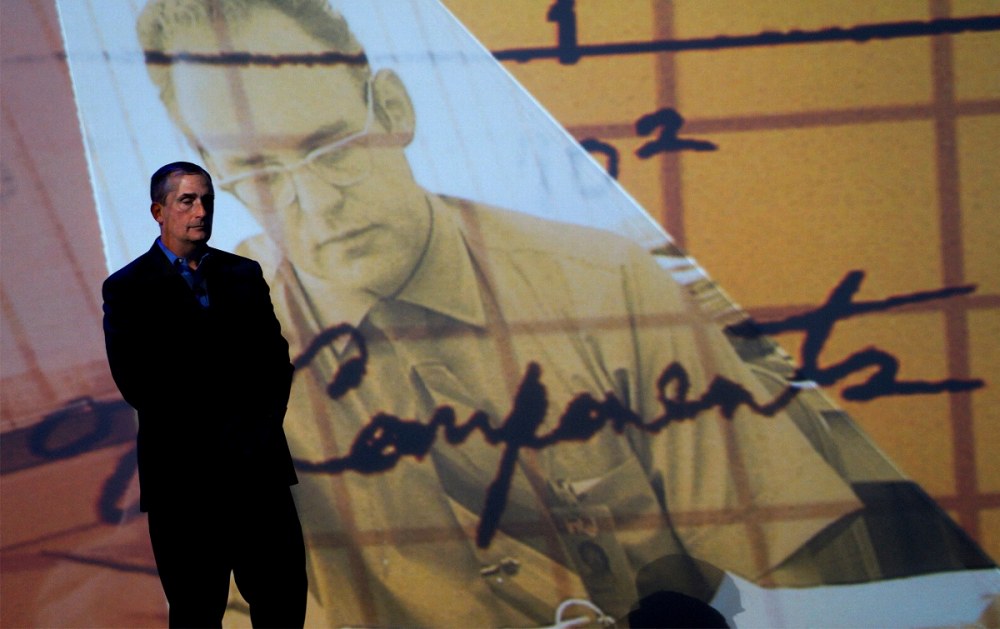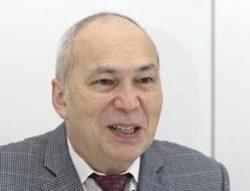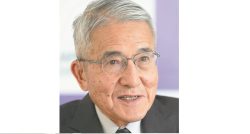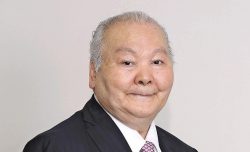
Projection of Intel co-founder Gordon Moore at the Intel keynote at the International Consumer Electronics show in Las Vegas, Nevada in January 6, 2015.
10:40 JST, March 25, 2023
SAN FRANCISCO(Reuters) – Intel Corp INTC.O co-founder Gordon Moore, a pioneer in the semiconductor industry whose “Moore’s Law” predicted a steady rise in computing power for decades, died Friday at the age of 94, the company announced.
Intel and Moore’s family philanthropic foundation said he died surrounded by family at his home in Hawaii.
Co-launching Intel in 1968, Moore was the rolled-up-sleeves engineer within a triumvirate of technology luminaries that eventually put “Intel Inside” processors in more than 80% of the world’s personal computers.
In an article he wrote in 1965, Moore observed that, thanks to improvements in technology, the number of transistors on microchips had roughly doubled every year since integrated circuits were invented a few years before.
His prediction that the trend would continue became known as “Moore’s Law” and, later amended to every two years, it helped push Intel and rival chipmakers to aggressively target their research and development resources to make sure that rule of thumb came true.
Integrated circuits will lead to such wonders as home computers – or at least terminals connected to a central computer – automatic controls for automobiles, and personal portable communications equipment, Moore wrote in his paper, two decades before the PC revolution and more than 40 years before Apple launched the iPhone.
After Moore’s article, chips became more efficient and less expensive at an exponential rate, helping drive much of the world’s technological progress for half a century and allowing the advent of not just personal computers, but the internet and Silicon Valley giants like Apple, Facebook and Google.
It sure is nice to be at the right place at the right time, Moore said in an interview around 2005. “I was very fortunate to get into the semiconductor industry in its infancy. And I had an opportunity to grow from the time where we couldn’t make a single silicon transistor to the time where we put 1.7 billion of them on one chip! It’s been a phenomenal ride.”
In recent years, Intel rivals such as Nvidia Corp NVDA.O have contended that Moore’s Law no longer holds as improvements in chip manufacturing have slowed down.
But despite manufacturing stumbles that have caused Intel to lose market share in recent years, current Chief Executive Pat Gelsinger has said he believes Moore’s Law still holds as the company invests billions of dollars in a turnaround effort.
‘Accidental entrepreneur’
Even though he predicted the PC movement, Moore told Forbes magazine that he did not buy a home computer himself until the late 1980s.
A San Francisco native, Moore earned a Ph.D. in chemistry and physics in 1954 at the California Institute of Technology.
He went to work at the Shockley Semiconductor Laboratory where he met future Intel cofounder Robert Noyce. Part of the “traitorous eight,” they departed in 1957 to launch Fairchild Semiconductor. In 1968, Moore and Noyce left Fairchild to start the memory chip company soon to be named Intel, an abbreviation of Integrated Electronics.
Moore and Noyce’s first hire was another Fairchild colleague, Andy Grove, who would lead Intel through much of its explosive growth in the 1980s and 1990s.
Moore described himself to Fortune magazine as an “accidental entrepreneur” who had no burning urge to start a company – but he, Noyce and Grove formed a powerhouse partnership.
While Noyce had theories about how to solve chip engineering problems, Moore was the person who rolled up his sleeves and spent countless hours tweaking transistors and refining Noyce’s broad and sometimes ill-defined ideas, efforts that often paid off. Grove filled out the group as Intel’s operations and management expert.
Moore’s obvious talent also inspired other engineers working for him, and, under his and Noyce’s leadership, Intel invented the microprocessors that would open the way to the personal computer revolution.
He was executive president until 1975 although he and CEO Noyce considered themselves equals. From 1979 to 1987 Moore was chairman and CEO and he remained chairman until 1997.
In 2023 Forbes magazine estimated his net worth at $7.2 billion.
Moore was a longtime sport fisherman, pursuing his passion all over the world and in 2000 he and his wife, Betty, started a foundation that focused on environmental causes. The foundation, which took on projects such as protecting the Amazon River basin and salmon streams in the United States, Canada and Russia, was funded by Moore’s donation of some $5 billion in Intel stock.
He also gave hundreds of millions to his alma mater, the California Institute of Technology, to keep it at the forefront of technology and science, and backed the Search for Extraterrestrial Intelligence project known as SETI.
Moore received a Medal of Freedom, the nation’s highest civilian honor, from President George W. Bush in 2002. He and his wife had two children.
Top Articles in Society
-

JAL, ANA Cancel Flights During 3-day Holiday Weekend due to Blizzard
-

Record-Breaking Snow Cripples Public Transport in Hokkaido; 7,000 People Stay Overnight at New Chitose Airport
-

Australian Woman Dies After Mishap on Ski Lift in Nagano Prefecture
-

Foreign Snowboarder in Serious Condition After Hanging in Midair from Chairlift in Nagano Prefecture
-

Train Services in Tokyo Resume Following Power Outage That Suspended Yamanote, Keihin-Tohoku Lines (Update 4)
JN ACCESS RANKING
-

Univ. in Japan, Tokyo-Based Startup to Develop Satellite for Disaster Prevention Measures, Bears
-

JAL, ANA Cancel Flights During 3-day Holiday Weekend due to Blizzard
-

China Confirmed to Be Operating Drilling Vessel Near Japan-China Median Line
-

China Eyes Rare Earth Foothold in Malaysia to Maintain Dominance, Counter Japan, U.S.
-

Japan Institute to Use Domestic Commercial Optical Lattice Clock to Set Japan Standard Time























